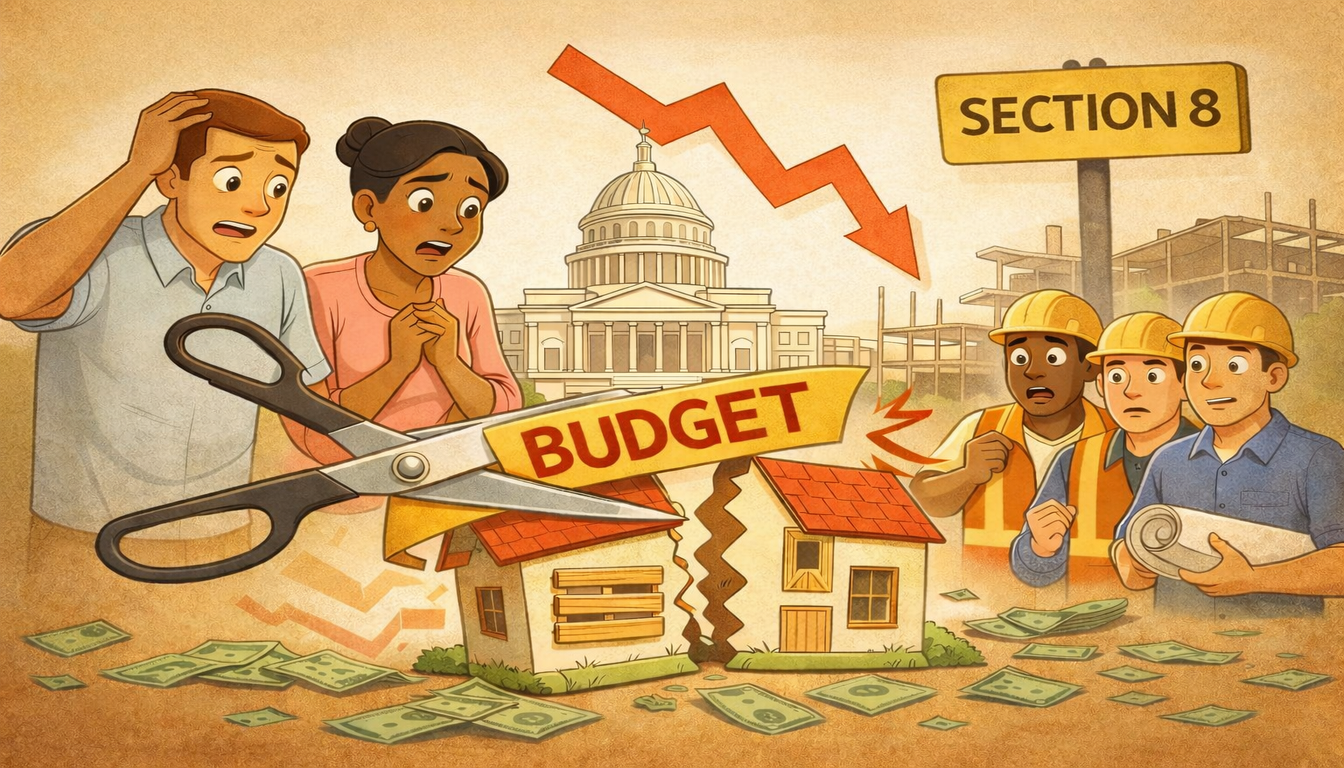
When the federal government shuts down, millions of Americans who depend on housing programs such as Section 8, Housing Choice Vouchers (HCV), and other federal subsidies are left waiting and worrying. The shutdown doesn’t just pause Washington—it pauses the housing system that keeps many families, seniors, and people with disabilities in their homes.
Below, we’ll explain what’s happening, how it affects both renters and landlords, and what steps you can take to protect yourself during this period of uncertainty.
How the Government Shutdown Affects Section 8 and HUD Programs
When the Department of Housing and Urban Development (HUD) closes or reduces staff, local housing authorities can’t move paperwork forward. HUD must approve many actions before tenants or landlords can proceed—such as:
- Voucher issuance or renewal
- Portability transfers between cities or states
- Requests for extensions or reasonable accommodations
- Approval for project-based or Continuum of Care (CoC) programs
With most HUD employees on furlough, many Public Housing Authorities (PHAs) are left without guidance. Some offices have limited operations; others stop answering calls altogether. This delay impacts both renters trying to secure housing and landlords waiting on payments or new tenant approvals.
In simple terms: when HUD shuts down, the whole system stalls.
Why Affordable Housing Is Facing Extra Pressure
Even before the shutdown, funding for affordable housing was shrinking. Many PHAs were already operating under tight budgets. Cuts have affected programs that support homeless families, domestic violence survivors, and people with disabilities.
Now, with a shutdown and funding uncertainty, PHAs are unsure which employees count as “essential.” This lack of clarity creates confusion, fear, and long delays.
For renters, this means longer waiting lists, frozen applications, and difficulty contacting housing offices. For landlords, it can mean late Housing Assistance Payments (HAP) and delays in approving new tenants.
If you rely on federal housing programs, patience and preparation are key right now.
What Renters Should Do
Even though you can’t control a government shutdown, you can take steps to stay prepared.
- Keep your paperwork ready. Gather and store copies of all your documents—voucher letters, lease agreements, income verification, and any correspondence with your housing authority. When HUD reopens, you’ll be ready to act immediately.
- Stay in touch with your local housing office. Even if phones aren’t answered, send an email to create a written record. Ask if deadlines are being paused (“tolled”) during the shutdown.
- Keep searching for housing. If your voucher is active, you can still contact landlords and view available units. Section 8 Listings provide current homes and apartments that accept vouchers.
- Don’t panic. Shutdowns are temporary. Once funding resumes, HUD and PHAs usually restart services quickly, although backlogs can take weeks to clear.
What Landlords Should Do
Landlords who participate in Section 8 or other HUD programs also face challenges during a shutdown.
- Expect possible payment delays. Housing Assistance Payments may be late, especially if your PHA relies on federal transfers. Keep clear records of all transactions and correspondence.
- Keep communication professional. Avoid evicting tenants solely because of voucher delays. In most cases, the delay is not the tenant’s fault.
- Plan for maintenance and inspections. HUD inspections may be postponed. Use the downtime to handle repairs so your property is ready when operations resume.
- Continue advertising units. If you have vacancies, consider listing them on Section 8 Listings that connect landlords with renters seeking affordable housing options.
Possible Policy Changes Ahead
Several policy discussions are shaping the future of affordable housing. Here are a few areas to watch:
- Time limits for vouchers. Lawmakers have debated whether to limit vouchers for non-elderly, non-disabled participants to two years. That would be a major change from the current open-ended model.
- Work requirements. New rules may require able-bodied adults to work or prove they are looking for work to keep their housing benefits.
- Funding for homeless programs. The Continuum of Care (CoC) and Emergency Housing Voucher (EHV) programs could face reduced funding, meaning fewer resources for those experiencing homelessness.
- Impact on seniors and people with disabilities. These groups will likely remain protected under most scenarios, but delays in approvals or funding could still affect their stability.
These potential changes are not yet law, but staying informed now can help you plan ahead.
How Immigration and Demographics Could Affect Housing Availability
Another trend shaping the market is immigration policy. Tighter immigration enforcement could lead to more available rental units, especially in major cities. However, this also means less demand in certain areas and potential instability for communities that rely on immigrant labor and culture.
While some believe this will ease the housing shortage, others worry it may harm local economies and increase vacancies in lower-cost markets. For renters, the main takeaway is that policy shifts at the national level can quickly change what’s available locally.
What to Expect When the Shutdown Ends
When HUD reopens, don’t expect an instant return to normal. It often takes weeks for housing authorities to restart full operations. Staff must process backlogged paperwork, reissue vouchers, and confirm pending payments.
Here’s what usually happens:
- Essential staff return first. They focus on restoring payment systems.
- Applications resume in order. New voucher requests and transfers get reviewed next.
- Inspections and renewals follow. Property checks and lease renewals come last.
For most families and landlords, it takes 30 to 45 days after a full reopening before things feel stable again.
Tips for Staying Ahead
-
Check official updates daily. Use HUD’s official website or check your local Public Housing Authority (PHA) page for verified updates. You can find your local housing authority using HUD’s search tool here: [Find Your Local PHA.
](https://www.hud.gov/program_offices/public_indian_housing/pha/contacts)
-
Don’t rely on rumors. Many social posts share false or outdated information.
-
Join housing support groups. Online forums and nonprofit housing organizations often share updates faster than local offices.
-
Explore local options. Some states have separate housing funds that can help during federal delays. Ask community organizations if any local aid is available.
Looking Forward: A Chance for Reform
While the shutdown has caused frustration, it also highlights weaknesses in the housing system. Many experts believe HUD and local authorities need simpler processes, better transparency, and stronger oversight.
If reforms are done right, this could lead to faster approvals, clearer rules for landlords, and shorter waiting lists for renters.
For now, the best thing both sides can do is stay patient, stay informed, and stay organized. The affordable housing system may be slow, but with preparation, you’ll be ready to move forward as soon as the doors reopen.
Final Thoughts
The housing crisis in the U.S. didn’t start with one shutdown—and it won’t end with one either. But understanding how the system works, keeping your paperwork in order, and knowing where to find reliable information can make all the difference.
If you’re struggling to understand how housing programs work or what steps to take next, try using Affordable Housing Assistant. It’s an AI-powered tool that helps renters, landlords, and applicants get quick, clear answers about affordable housing and Section 8—without the long waits, confusing paperwork, or costly consultants. This AI expert assistant explains complex housing rules in plain language and gives you personalized, step-by-step guidance based on your situation.
Affordable housing may be hard to find, but with the right resources and persistence, renters and landlords can both come out stronger when the system restarts.
Navigating the Section 8 housing process can feel overwhelming, and that's where Section 8 Search comes in. We're more than just a listing website; we're a dedicated resource designed to make finding housing under the Housing Choice Voucher Program straightforward and stress-free. Our platform offers user-friendly tools to explore listings and waiting list statuses nationwide, all built on official HUD data. We're also passionate about providing clear, helpful information and guidance, empowering you with the knowledge you need to understand eligibility, complete your application, and confidently navigate your housing journey.


.png)
.png)
.jpg)



.png)
.png)
.png)





.png)
.png)
.png)
.png)
.png)